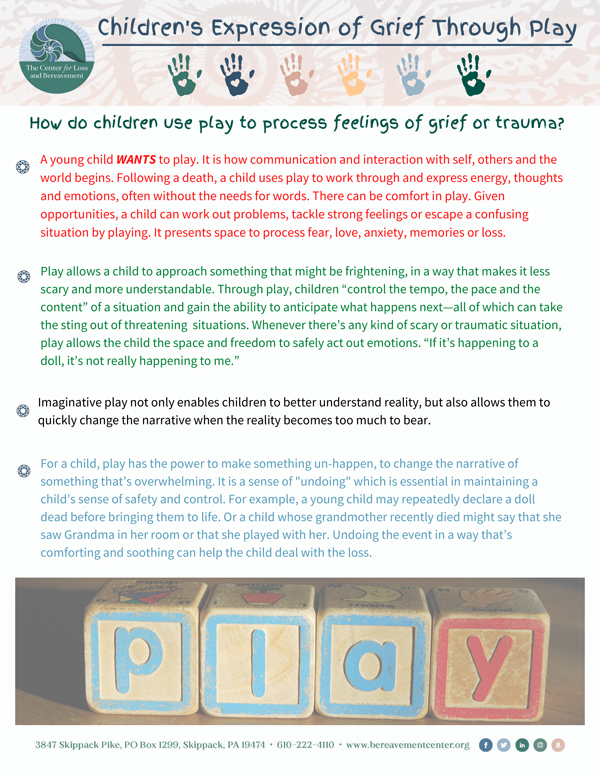CLB Tip Sheets
Children’s Expression of Grief Through Play
How do children use play to process feelings of grief or trauma?
A young child WANTS to play. It is how communication and interaction with self, others and the world begins. Following a death, a child uses play to work through and express energy, thoughts and emotions, often without the needs for words. There can be comfort in play. Given opportunities, a child can work out problems, tackle strong feelings or escape a confusing situation by playing. It presents space to process fear, love, anxiety, memories or loss.
Play allows a child to approach something that might be frightening, in a way that makes it less scary and more understandable. Through play, children “control the tempo, the pace and the content” of a situation and gain the ability to anticipate what happens next—all of which can take the sting out of threatening situations. Whenever there’s any kind of scary or traumatic situation, play allows the child the space and freedom to safely act out emotions. “If it’s happening to a doll, it’s not really happening to me.”
Imaginative play not only enables children to better understand reality, but also allows them to quickly change the narrative when the reality becomes too much to bear.
For a child, play has the power to make something un-happen, to change the narrative of something that’s overwhelming. It is a sense of “undoing” which is essential in maintaining a child’s sense of safety and control. For example, a young child may repeatedly declare a doll dead before bringing them to life. Or a child whose grandmother recently died might say that she saw Grandma in her room or that she played with her. Undoing the event in a way that’s comforting and soothing can help the child deal with the loss.
How can adults set the stage for healthy play?
Grown-ups play a key role in setting the groundwork for “productive play”—which can help children process their experiences while watching for signs of distress. Adults shouldn’t be overly worried that children will lead themselves down roads they aren’t prepared to navigate: the very instinct to explore a subject in play likely means that the child is ready and perhaps needs to do so.
Safety and Variety: Creating safe places where children can “work” at their play is crucial. After a loss, while adults may think they need to direct the process and be part of everything, hovering or asking too many questions may actually limit a child’s freedom to explore on their own, especially if the adult is grieving as well. Having a variety of materials including dolls, dress up clothes, art supplies, and gross motor toys set in an area which is familiar, child-safe, and private (if requested) is ideal.
Encourage, don’t shame: Play is highly personal. Children tend to interpret negative feelings or dismissal of their play as criticism of themselves. Adults may want to communicate that “there’s nothing you could say to me that would be too weird, too annoying, could make me think you are bad.” Do not be afraid to ask the child to tell you about their play and ask if/how they would like you to play with them. Adults can learn a lot by encouraging and participating in child-directed play.
Create room for imagination: Encourage “multi-use” toys—generic objects like blocks and wooden dolls, which children can use to express what they need. When children have a Superman action figure, they tend to play out Superman storylines. When they have a faceless figure, they engage with their own thoughts and emotions…what they find exciting, troubling, or confusing.
Watch for unproductive play: In general, adults should not intervene in children’s play unless invited by the child. However, if the child’s play makes the child anxious, that could be a sign that the play isn’t serving its purpose. In these situations, adults can gently introduce new elements or coax the narrative in a new direction. For example, if a child is showing grief or anxiety related to a school shooting or the effects of the Covid-19 pandemic by repetitively and obsessively playing dead, it might be helpful to play hospital or doctor with the child to show healthy ways of intervention or coping.
Look for change in play: Repetition in play is common and is used by a child to sort through problems until solutions are found. If the play becomes more aggressive or frustrating over time, adult intervention or counseling may be helpful. Look for absence of play: The trauma of grief may be overwhelming for the child to handle and they may not play as a result. Children need to have a certain sense of safety to escape into an imaginary play zone. Adults can provide that safe space—being careful to strike the right balance between the freedom children need to explore difficult subject matter on their own, and the periodic need to step in or seek additional help when kids get stuck.
Join Our
Mailing List
Donate
Today
Request
Information

Affiliations
• NACG
• CBEM Changemaker
• ADEC
• Charity Navigator
Quick Links
About Us
Individual & Family Grief Counseling
Volunteer
News
Grief Support Resources
Contact
Ph: 610-222-4110
Fax: 610-222-4116
3847 Skippack Pike
P.O. Box 1299
Skippack, PA 19474
Support The Center For
Loss and Bereavement
